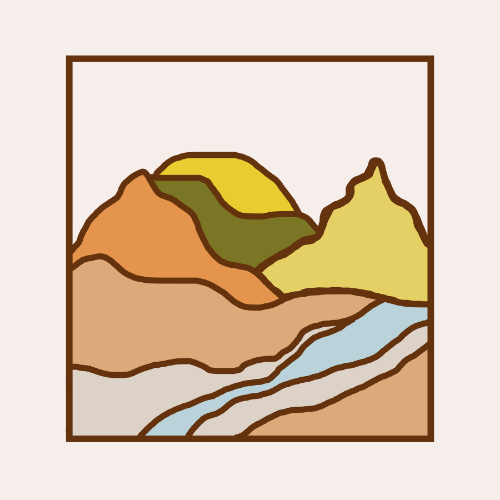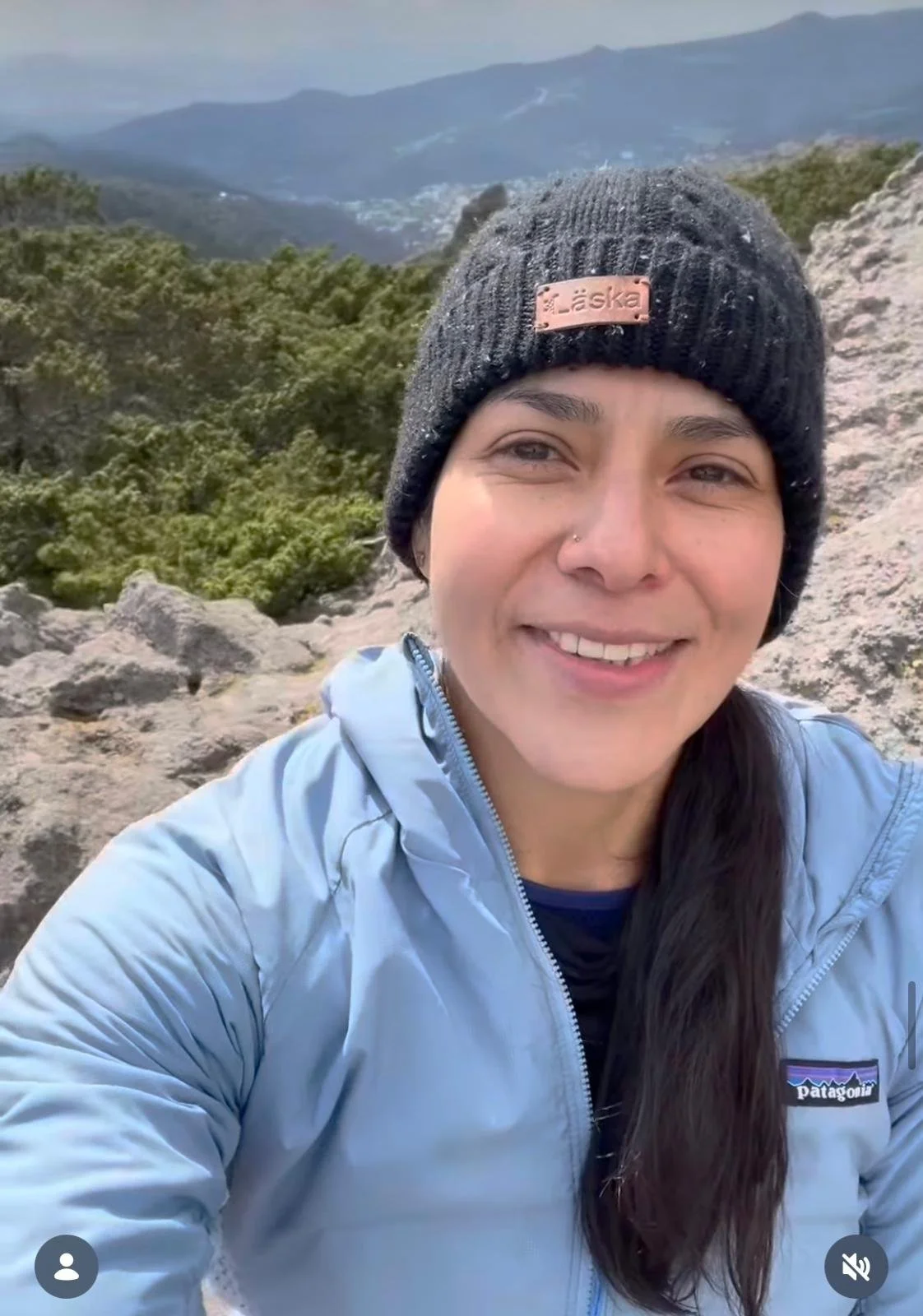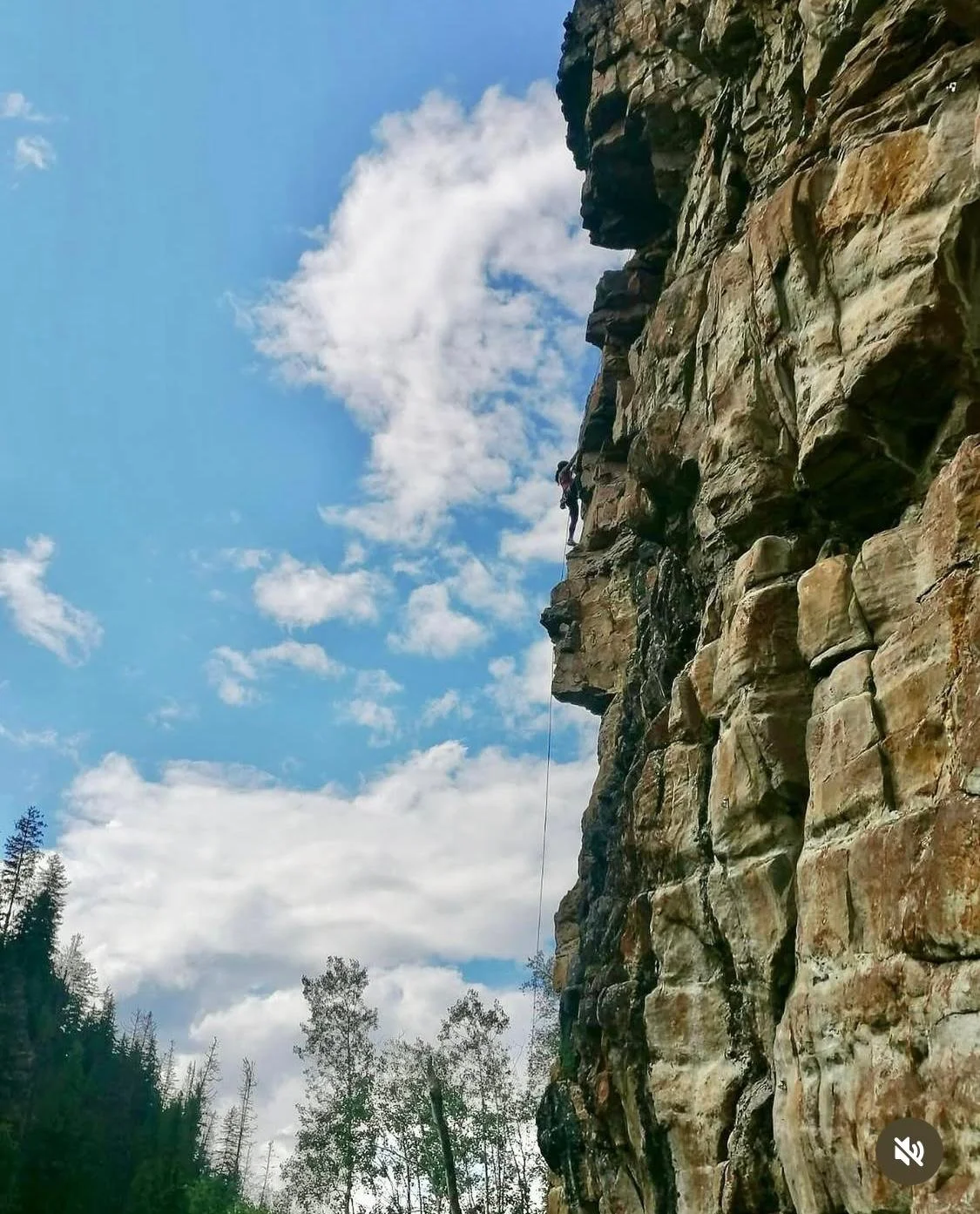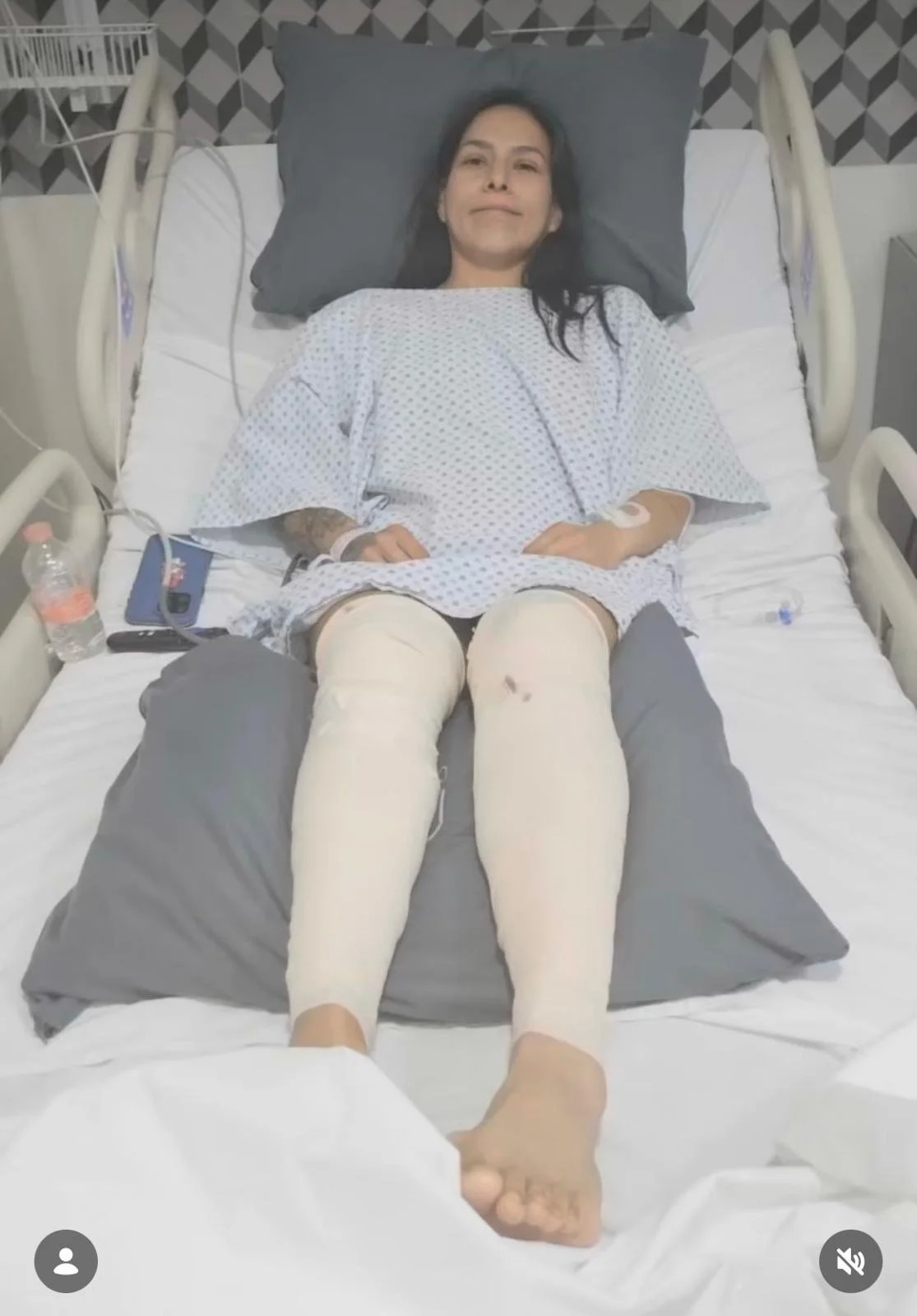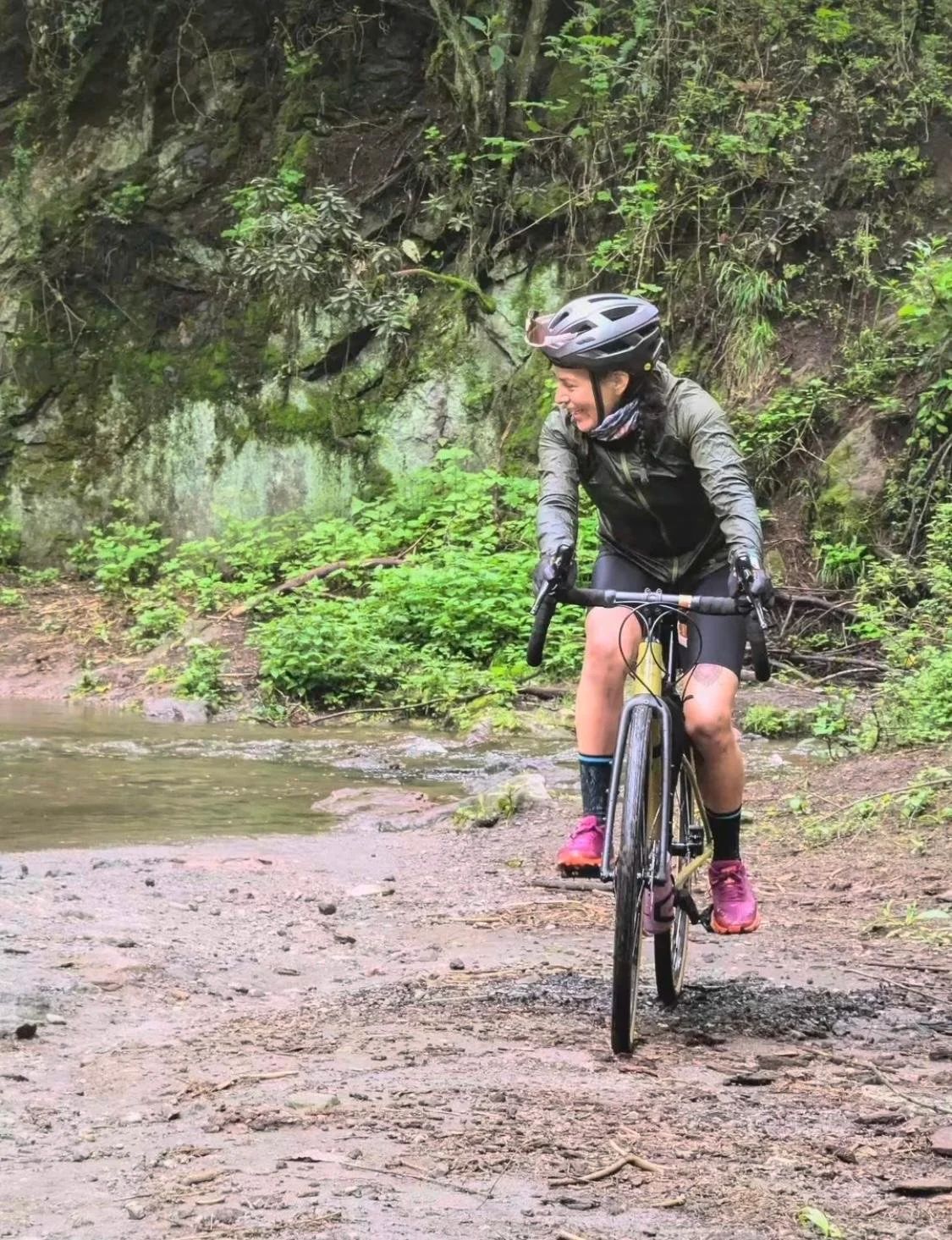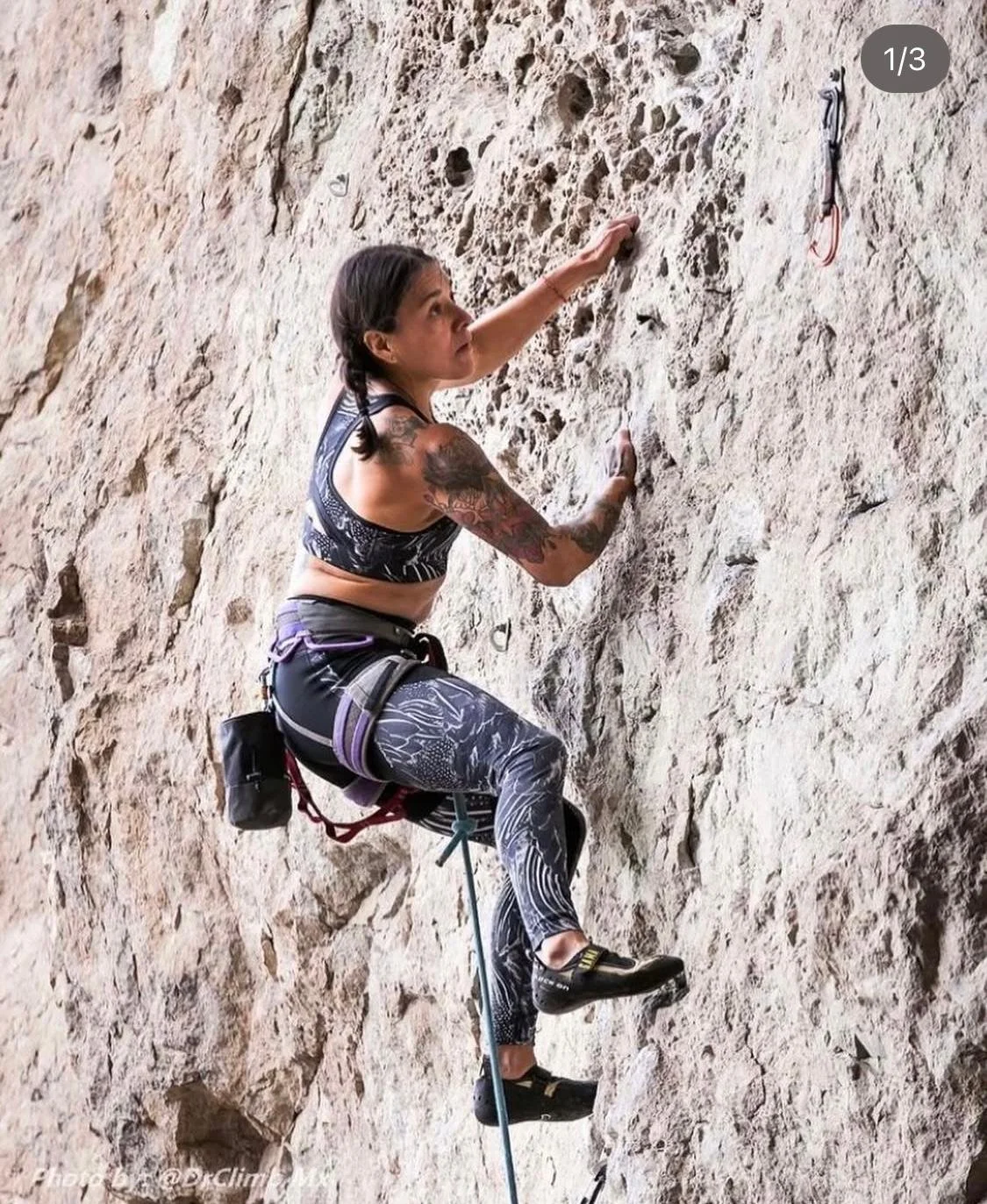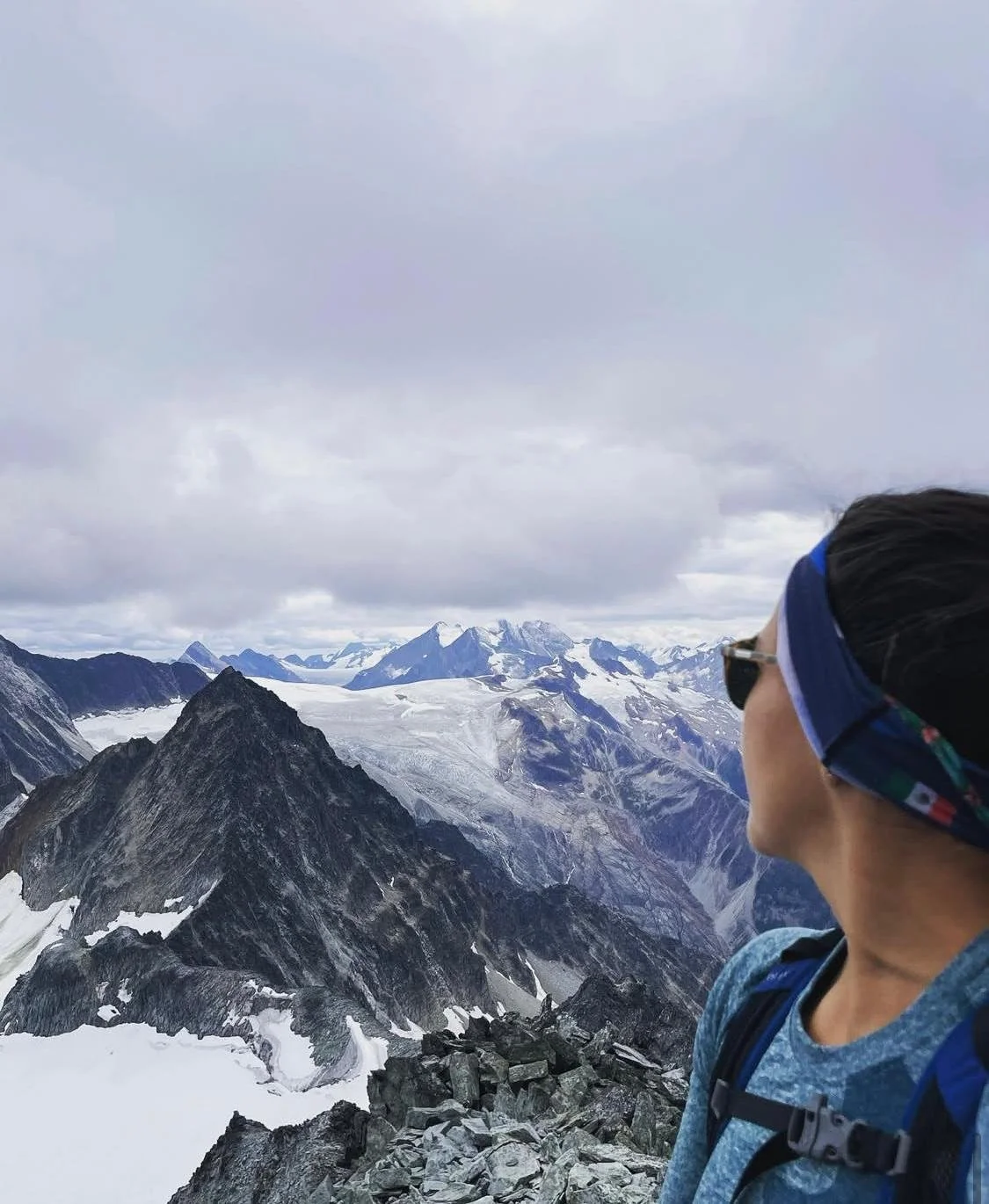Isabel’s Story - Returning to the Mountains
A story of injury, independence, and rediscovering adventure — for women who refuse to stop dreaming.
R - Hey Isabel.
I - Hey Ris
R - This is fun. So you’re living in Canada. You’re from Mexico. How did you get here? And what were you doing before your accident?
I - Yeah. Well, I came to Canada three years ago. As you said, I'm Mexican. I'm almost 40, and somehow I'm still pursuing things, right? Like still dreaming stuff and having some goals in life. Maybe almost 8 years ago, I started to do more mountain sports and I took some courses in Mexico, like mountaineering, we say, low mountain and high Mountain.
R- Oh yeah.
I - Which is kind of the hiking or alpine difference here, right? And, I just got more interested in climbing after. So, climbing, I started maybe four years ago. And then yeah, I wasn't really having a good time in Mexico. And I was doing great in my personal life. I was having some improvement in my sport life. I was training for the Boston Marathon because I qualified like a year before that. I was getting everything. But I wasn't really happy with some stuff. I wasn't fully happy. Right?
R - Yeah.
I - I was feeling like something was missing. So I decided to come here. I contacted a friend that I had met before, and he hosted me for three months.
R - Oh my Gosh.
I - Yeah. In Calgary.
R - That’s such a good friend.
I - He's a really good friend of mine. And now she's getting married with a Colombian girl. And he's Indian. And that's the weirdest thing because his mum was always like, “What is this girl doing in your home?” So it was super funny that part. And, yeah, he helped me a lot. I was actually kind of depressed, because I've suffered from depression since I was 15 or less. I got this diagnosis really early in my life, and I just took medication really early in the diagnosis, and then I quit because I was a track and field athlete, and when I was taking the medications, it wasn't good for me. I couldn't even wake up to do my things, and I just quit with that. I just learnt to deal with that thing, trying to avoid the feelings. Kind of getting this dopamine that I need with my physical activity somehow.
R - Yeah.
I - So I was there in Calgary, all depressed and blah blah.
R - Haha.
I - And he talked to me, and he was like, well, you have to go out of my home, you know? You have to move on. You have to work on your things. And I was really grateful for that. Because I was like, “Can I stay with you forever?”
R - Haha.
I - And then I was looking for a job, and finally I moved out of there. It was super funny because the first time I came to Golden, I looked at the town and thought, “What is this place, it’s so dead.” Haha.
R - Haha. I think that’s how I felt when I first arrived as well.
I - And I started working, and then I started to look for people for climbing. I went to the gym, that’s the place to meet climbers, right?
R - True. Haha
I - And then I started making some friends, and I felt really good. Like, finally, I feel better. So my idea was to just become more knowledgeable in the mountains. Also, with my career, I wanted to have more knowledge in the outdoors in nutrition because it's different. I'm specialising in sports nutrition. But now my focus I want it to be more in the outdoors in expeditions and things like that. So, first thing I tried to switch, because I was a snowboarder before, so I was like, “Okay, I will learn to ski.”
R - In the backcountry.
I - Yeah, in the backcountry to explore the mountains and things like that. Some of the things were easy for me because all my life I have been really active and physical. I thought skiing would be the same. And at the beginning, it kind of was. I was skiing here at Kicking Horse, but that year, it wasn’t good snow. So I have all the stuff for skiing, and I was like impassioned, I just want to go skiing. And I even had my instructor because I made a deal with a friend. And he actually taught me well. We went maybe three times. So then, after I became kind of confident. And then on another day, my friend Cara called me and she was like, “Do you want to go skiing?” And I was having one of those days. Sometimes I'm really strict with myself. Sometimes I'm like, I have to do this and that, and I'm a pretty kind of disciplined person. I was feeling strong and I was climbing and running and biking indoors, for example. So actually I was kind of tired, but she asked me and I just said, “Let’s go.” So we went for a morning ski. It was like super icy again and horrible. And I fell and I hit my butt and I was like, “What? This hurts so bad.” It was completely hard.
R - Your muscle just tensed up.
I - Yeah. And I was like, “No, I'm not doing this.” So I told Cara, “I just want to go back, I don’t want to ski in this.” And then she was like, “Yeah, let's go.” So we kept going down. After that, I thought so many things. And actually, I didn't want to be there. I was tired and I wasn't feeling okay. And I just went when I shouldn’t have because I just wanted to get all the things done. So I just wanted to go down quickly. I was feeling I was fast, but I didn't mind. And Cara saw me, she was like, “You’re going fast.” And I was like, “Yeah, kind of, let’s go, let’s continue.” And there was a moment where I couldn't break.
R - So you were trying to side stop, but it wasn’t working.
I - I couldn't really manage anymore, my body going at a good speed. And finally, I became stuck somehow. And when I was stuck, I just spun. So then my skis were all the way in and all the way out. Horrible. And then I just heard the knees, and I felt the bones.
R - Oh my gosh.
I - And then I was like, yeah, I broke my legs. That was my feeling at the moment. So I screamed. Cara came to me and she asked, “Are you alright?” And I was like, “No, I’m not alright.”
R - Haha, that’s a good answer.
I - And then I checked my legs. I felt weird, but we could still go back. We kept skiing down. We finished the day skiing.
R - So you skied back down with broken legs. Haha. Did it not feel weird?!
I - You feel something is stuck and swollen. The other thing is, I can handle really high pain. So that's another bad thing. Sometimes I don't really realise when I really have high pain. It’s kind of a good thing, kind of bad, right? We went to the medical help there, but they couldn’t give me anything. And I was like oh whatever, I just went to buy some painkillers, and I was taking them. And then the next day, I went to the gym because I was teaching these fitness classes.
R - Oh no. Haha. The show goes on.
I - And they kept doing that for a week, maybe.
R - You had broken legs for a week!
I - No. I did have broken legs for months, actually.
R - Oh my gosh.
I - Yeah. Then, after I was taking an ice climbing clinic in Canmore. So I was like, “I'm going to Canmore for the ice climbing clinic, so I will go to the physio there.” So then I went to the physio and the physio told me it was a sprain. And he told me you will need physio and rest, and you will be fine. I was like, okay, I will go back home and take a vacation there. My physio can check me, and then I will come back. That was my idea. And then I fly back to Mexico like another week after. I went to the physio. My physio checked me, and he was like, “Uh uh, I'm not doing anything because this is not okay.” He’s my friend. He's been my physio for maybe 12 years. And I was like, you're kidding. And he's like, “No, this is not okay at all. So you should get an MRI.” So I went and finally I realised everything was broken. So I broke both my ACLs, the MCL and the meniscus. So I needed surgery. So it was horrible. I have always been the person who resolves everything, right? Like, whatever I need, I just do it. I don't ask for help. Like, when I feel depressed, I just look for a way to fix myself. It was really hard for me because I was so stressed and struggling so much with this situation, and I didn't have the money to pay for the surgery right away. And I was looking for a good doctor. And all these things, I was by myself all the time. When I finally realised I had to pay for the surgery and everything, which was really expensive, I got a bank to lend me some money, but it wasn't enough. Still, I needed more. So I asked for crowdfunding after two months of being in Mexico, trying to solve my situation. And when I asked for help, I did it because I couldn’t anymore. I couldn't deal with that anymore alone.
R - It's a lot.
I - When you are like so independent and everything, it's hard to ask for help. But it feels good. Finally, you can breathe. And then also I discovered I wasn’t alone. Because most of the people who helped me, I know them. They were my friends, my clients. Finally, I got the surgery. The recovery was hard. Because when you lose your capacity of being able to do everything by yourself, and then you need everything, it was really hard. Like, I remember the doctor was like, before I got the surgery, he was like, “You need a lot of support.” Haha. And I was like “Yes doctor, the persons are going to help me”, because I was all the time by myself. Because things with my family are not great.
R - How long was your recovery? You stayed with your family.
I - So I spent three weeks in bed. I couldn't really even go to the chair. I couldn't even sit on the toilet because it was too close to the wall, and my legs had to be kind of extended. And then I had this chair next to my bed, and oh it was horrible having always to ask, “Hey, will someone help me?” And then in the chair, it was kind of also anxious because you actually want to walk, but you cannot stand at all. And that was another month and a half. Even for me, at the beginning, to even just walk it was really hard. Like I couldn't walk a block. But I could bike. So I started indoors. And then I was like I want to do a bike trip. So that's going to be my goal, because I was actually depressed again, unfortunately.
R - I can imagine.
I - There were days I was crying the whole day. And it’s not a thing that you can really control; you cannot stop crying. Fortunately for me, I knew what was happening. Because I know there are people who don't even realise what is happening. So, I kind of just tried to keep going. So I focus on this bike trip. So the first time I was riding outside, I was so afraid. And since the accident, I’ve been experiencing a different kind of fear that I didn't have before. All my life, I have been a person who does everything alone. I used to travel alone, and I like to be alone. I run alone when I’m doing my distance alone. I can ride alone. So many things, but the first time I went out with the bike by myself, I was afraid, really afraid. And then I think that was the hardest part was the recovery. Because the physical somehow is easy when you’re disciplined, but the mental, having all these fears, is like you're not confident anymore.
R - Do you feel vulnerable because you are in a weaker state?
I - Mmm hmm. Yeah. So I feel vulnerable, and I felt like I needed someone to know what I'm doing or where I am in case something happened. I’ve never felt that before. So I did this bike trip with a friend. And he was really nice to me. He was training all the time with me. Even when I was, like, super weak, and I think that other people would be afraid to bring me to the mountains.
R - Yeah. Like saying, “You're not ready, you’re still recovering, this would be too much.” How long was the trip?
I - So the trip was four days. It was almost 350km. So we were camping, and it was a really hard trip, with over 3000 elevation gain.
R - Good on you.
I - And I felt way better after that. Not as confident as I used to be. But much better. And when I started running again, it was super hard. And still running is a hard thing. Every time I'm running, it’s painful, and I enjoy it somehow.
R - Haha.
I - Haha, not the pain. I mean the running sensation. I mean, because I'm happy. I’m still doing everything, so I'm grateful for that. Everything is hard. Everything is different in my body. Sometimes people are like, “But you’re 100% recovered”, but it doesn’t feel the same. The pain I have all the time is bothering and it’s annoying, it's in there. I don't know if it will ever be the same somehow. But I just keep going. So now it’s dealing with that physically, and somehow mentally it becomes an insecurity. Because you know, like maybe I'm not strong enough for this, or maybe I'm not gonna be able to do this. So I'm still not climbing leading. But not because I’m not capable, it’s because mentally it’s hard to commit. I was talking with my roomie the other day, and he said, “But you’re so strong”, and I'm like, “Yeah, but it doesn’t matter if you're strong physically, you have to be strong mentally.”
R - That’s so true.
I - So that's been the journey. I’m working all the time on it, I’m just trying to face this, and it feels good. When I’m done with something, I feel better after. And it makes me feel like I’m capable too. Like, for example, I remember we went to a crag that is kind of hard around here. And a friend was chickening out. And he was like, “I don’t know, I don’t want to lead this.” And I was like, “Give me the rope, I will do it.” Haha.
R - Haha.
I - And I did it, and once I was up on the wall, I was like, “What am I doing here?” But finally, when I was done, I was like, “Thank God I did it.” And it felt so good after.
R - Just to overcome that fear barrier. That’s amazing. I mean, I haven't experienced an injury like that myself, but…
I - Good, take care. Haha.
R - I don't know, it's just it sounds so difficult what you walked through and not only the surgery, but then having to deal with family dynamics, and having to overcome that barrier of asking for help. Then healing and becoming independent again, but then having mental barriers of, although I’m capable, I still don’t feel like myself, I’m still in pain. It’s such a long journey. You haven’t come out the other side perfect, but I think it’s amazing that you walked through it, and you set those goals.
I - I learnt some lessons from this. I like to say things happen for a reason, but I don't want to say this happened for a reason because it was horrible. And I don't think someone has to go through something like this to learn stuff. But definitely I learnt some things. And the first thing that I learnt is it’s not bad to ask for help. That’s number one. Number two is to recognise your limits. And it’s ok that you have limits. Because I’m always pushing, I need to do this, I need to do that. And it’s ok if you don’t do it. Why do you have to force yourself to do something? I’m still learning to allow myself to let go of stuff. Even recently, I was planning something with a friend of mine, and she bailed, and I was like, “Oh I really wanted to do it.” And then I was like, “It’s ok, the mountain is going to be there, it’s going to be fine.” Focus more on the things I can control and not focus more on the things I can’t actually control. There are so many things you can’t control. I also blamed myself so badly, all the time I thought, maybe it was my fault, because I went and I was tired. And I wasn’t born in a country where I could have learned skiing when I was younger. And it was my fault because I was trying to pursue the best of the trip. Maybe I did something wrong, you know? But it's not that. Even after some people asked me, “Did you check the bindings?” And I was like, “Yeah, I did it.” I'm Mexican, right? So sometimes we are like, whatever, but I wasn't. I did all the things that I had to do, seriously. I went to the store and said, “Could you check my bindings?” So I did everything right. It wasn't my fault. That's another thing I learned. It wasn’t my fault. Because for so long, I was thinking it was my fault. And then when the people judge you or see you go back to your things, they say you didn’t learn anything.
R - Like you need to stay safe. Why are you still choosing this adventurous life? You’re just going to cause something else to happen.
I - But maybe I learnt more than they understand, right? Because I know that I want to live doing what I like. And I'm grateful for that because I can still do my things. So I can't blame myself is another thing. Because you could do everything perfectly, and it’s not your fault. And the last one is, it’s going to take time to heal. Not just physically but also mentally, and it’s fine. You just have to keep working on it.
